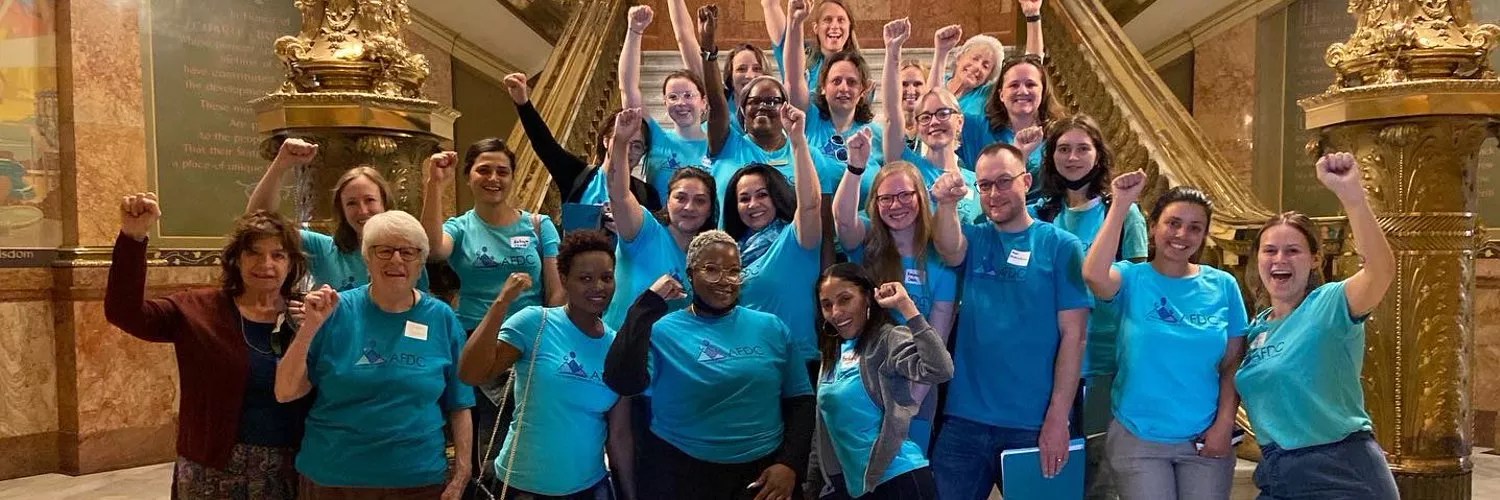
courtesy Kayla Frawley

Audio By Carbonatix
I was about halfway through my pregnancy when I worked at the local domestic violence shelter, SafeHouse Denver, in 2016. I was growing bigger at the end of my pregnancy, and I remember that the families I worked with were so kind: They’d open all the doors, offer all the snacks, and give me unsolicited advice and prayers. While I worked at a women’s shelter, I was surprised that as an employee, I wasn’t explained the process for requesting or taking paternity or maternity leave – and instead, had to inquire from a trusted co-worker.
Luckily, a couple of weeks prior to finding out about my pregnancy, I had signed up for third-party short-term disability with Aflac, which was the only way an employee of SafeHouse Denver could take any kind of extended paid sick time beyond earned paid time off. The majority of working Coloradans who have the ability to do so use a short-term disability insurance plan (on top of their primary health insurance plan) to cover their income during the postpartum period after having a baby, or to deal with a chronic (or terminal) health issue.
In 2016, when I signed up for short-term disability with Aflac through my employer, I was paid $15.60 an hour as a bilingual family advocate; I was making $32,448 a year. The short-term disability with Aflac would pay you 60 percent of your income, but only after you used all of your earned paid time off, which equated to $374 a week for me at that time. I remember quickly realizing that I couldn’t afford to take much time off to heal from childbirth, even with a short-term disability policy. I also couldn’t afford child care, so I immediately needed to make a lot more money to keep working a full-time job.
Like countless working parents in Colorado, I took on a mix of three part-time jobs without benefits – that maximized my time with my newborn, and would pay me cash. I was a waitress at TAG Burger, an in-home nanny for a new mom in Littleton, and did contract work for a midwifery institution. I got on daycare and child-care lists I knew I couldn’t afford. Even with all those jobs, I still qualified for Medicaid and faced a lot of stress as a brand-new single mom. I was able to be off work for about four weeks postpartum, and that was not enough to heal.
Unfortunately, 25 percent of women are forced to return to work within two weeks of giving birth to support their families, so I was lucky. Lower-income women – like myself in 2016 – are 58 percent more likely to not take any maternity leave. In that way, I was lucky, too.
I haven’t forgotten how much my family, like so many other families in Colorado, would have benefited from having paid family leave. The benefits of paid leave for families who give birth improve health outcomes for an infant, who has time with the primary caregiver, and the birthing parent who needs to heal postpartum without becoming susceptible to infection and maternal morbidity.
When my son was two years old, I advocated for the Family Medical Leave Insurance (FAMLI) task force bill during the 2019 legislative session, spearheaded by 9to5 Colorado and state senators Faith Winter and Angela Williams and state representatives Matt Grey and Monica Duran. I remember nervously testifying for one of my first (of many) times in front of the Colorado Legislature on behalf of FAMLI, knowing this policy would have made such a dramatic difference in my life. Eighty percent of Coloradans didn’t have access to paid family medical leave in 2019.
When families testify at the Capitol on behalf of bills that would have or could have supported us at some point, we expose ourselves to reliving challenging moments in our life that are often associated with trauma.
Later that year, I was thrilled to organize with other working parents, 9to5 and Colorado voters to get Proposition 118 passed in November 2020. Proposition 118 created the Paid Family and Medical Leave Insurance (FAMLI) program. The program will make sure that all workers have access to paid leave to take care of themselves during a huge life circumstance, like the birth of a baby.
Premiums will start in 2023, and FAMLI will start providing benefits to employees starting January 1, 2024. While eligible employees will receive up to twelve weeks of leave, those who have pregnancy or childbirth complications could receive an additional four weeks.
As a former midwife, I have always known that we need sufficient time to heal, bond and adjust to life as new parents. Particularly in Colorado, mental and behavioral health conditions postpartum is the number-one reason for maternal mortality. Paid Family Medical Leave has benefits for the life span of the birthing individual and the infant. As a mom who gave birth in Colorado, I learned quickly that not everyone was awarded that. And now I am committed to seeing this program effectively touch as many Coloradans as possible. Parents and their children deserve the best head start possible.
Premium payments begin in 2023: Are you and your employer aware?

Kayla Frawley
Kayla Frawley is the director of Reproductive Rights at ProgressNow Colorado. She is a former midwife, former direct service provider and single mom in Denver who has devoted her career to engaging working families in the policy and legislative process. Reach her at twitter.com/kaylaqfrawley.
Westword.com frequently publishes commentaries and essays on matters of interest to the Denver community; the opinions in them are those of the authors, not Westword. Have one you’d like to submit? Send it to editorial@westword.com, where you can also comment on this piece.